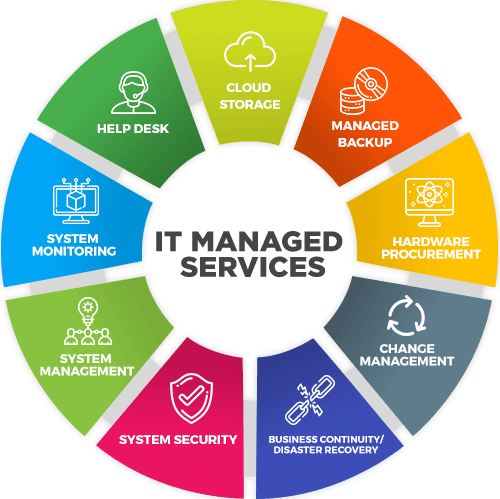
MANAGED SERVICE PROVIDER
Managed IT services can provide significant benefits for small and medium-sized businesses (SMBs) by helping them to improve their technology infrastructure, increase productivity, security compliance and reduce costs.
One of the main benefits of managed IT services is that they allow businesses to outsource their IT needs to a team of experts. These experts can provide a wide range of services, including network management, data backup and recovery, and software updates. By outsourcing these tasks, businesses can free up their own internal resources and focus on their core business operations.
Another benefit of managed IT services is that they can help businesses to improve their technology infrastructure. Managed service providers (MSPs) can work with businesses to identify and implement the best solutions for their specific needs. This can include upgrading hardware and software, implementing new security protocols, and providing remote access to company data and applications.
 Managed IT services can also help businesses to increase productivity. By providing a reliable and secure IT environment, MSPs can help businesses to avoid the downtime and disruptions that can occur when technology fails. This can allow businesses to focus on their work without worrying about IT issues.
Managed IT services can also help businesses to increase productivity. By providing a reliable and secure IT environment, MSPs can help businesses to avoid the downtime and disruptions that can occur when technology fails. This can allow businesses to focus on their work without worrying about IT issues.
Finally, managed IT services can help businesses to reduce costs. By outsourcing their IT needs, businesses can avoid the costs associated with hiring and training internal IT staff. Additionally, MSPs can often provide businesses with more cost-effective solutions than they could find on their own.
Overall, managed IT services can provide significant benefits for small and medium-sized businesses by helping them to improve their technology infrastructure, increase productivity, and reduce costs. By outsourcing their IT needs to a team of experts, businesses can free up their own internal resources and focus on their core business operations.
Services Comparisons
Break/Fix IT Support: This approach involves fixing issues as they arise, also known as reactive IT support. This means that if a problem occurs, the IT company will be called in to solve the issue, after which the support ends until the next problem arises. This approach can be costly for businesses, as the IT company will charge for every individual service, and it is difficult to budget for these costs as it is uncertain when the next issue will arise.
Consulting: This approach involves contracting for specific projects or tasks. This might include setting up new equipment, networking, or other specific IT needs. Like break-fix support, consulting is mostly reactive in nature, meaning that the IT company will only provide services as requested.
Managed IT Services: This approach involves proactively managing and maintaining a business's IT infrastructure. The IT company provides a set of services that are designed to keep the technology systems running smoothly and prevent issues from occurring in the first place. This approach is more cost-effective, as businesses pay a flat monthly fee for IT support, rather than paying for individual services as they arise. The IT company provides ongoing monitoring and maintenance to ensure that systems are operating efficiently, and they are available to provide support when needed.

In conclusion, while break-fix and consulting can be useful in specific circumstances, managed IT services offer a more comprehensive and cost-effective approach to IT support for businesses. By proactively monitoring and maintaining IT systems, managed IT services help to ensure that technology runs smoothly and prevent problems from arising, saving businesses time and money in the long run.
